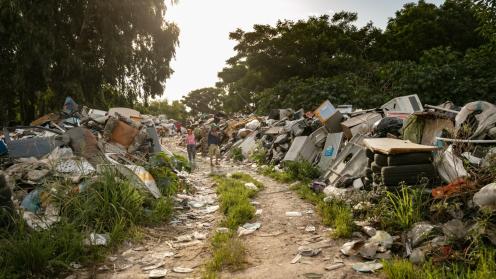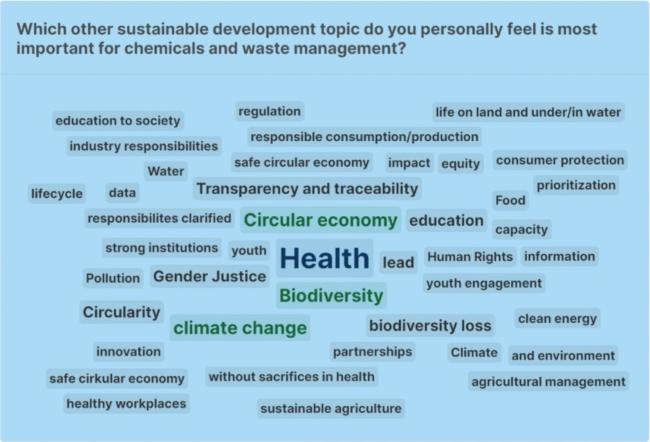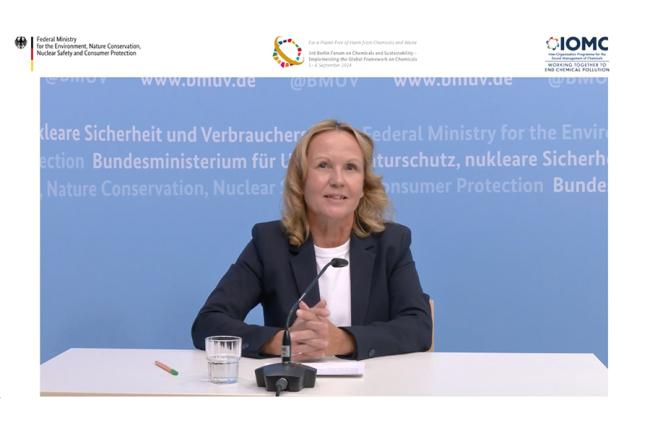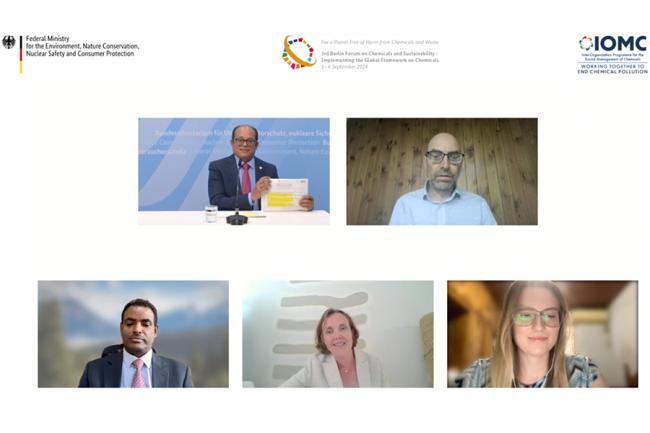The adoption of the Global Framework on Chemicals (GFC) in 2023 marked a milestone in efforts to ensure the sustainable management of chemicals. The ongoing challenge now is to ensure that the Framework is translated into concrete action and that all stakeholders work together to implement it.
Welcoming participants to the 3rd Berlin Forum on Chemicals and Sustainability, Co-Moderators Rolph Payet, Executive Secretary, Basel, Rotterdam and Stockholm (BRS) Conventions, and Minu Hemmati, consultant, German Federal Ministry for the Environment, Nature Conservation, Nuclear Safety and Consumer Protection (BMUV), underscored the theme of GFC implementation.
In her opening statement, Steffi Lemke, Federal Minister BMUV, Germany, highlighted the Forum as an opportunity to take stock of the GFC’s implementation, learn about chemicals initiatives launched since the adoption of the GFC, and share experiences to improve the management of dangerous chemicals. She discussed some of her country’s efforts, including the adoption of new rules to improve the exchange of chemicals information along the supply chain, and Germany’s contribution of Euro 20 million to support work on the GFC.
In a keynote speech, Axel van Trotsenburg, Senior Managing Director, World Bank Group, underlined that the unchecked use of chemicals, materials waste, and chemical pollution, are defining challenges of our time. He emphasized the role of the private sector, especially the chemical industry, in providing safer chemicals, stressing the importance of prevention, as “cleaning up later is expensive for our wallets, health and the planet.”
To set the scene for the Forum’s discussions, representatives of six Participating Organizations of the Inter-Organization Programme for the Sound Management of Chemicals (IOMC) joined a panel session to discuss their respective and collective experiences in driving GFC implementation. In an opening presentation, Johannes Heister, Senior Environmental Specialist, World Bank, and Chair, IOMC, underscored the importance of developing a robust organizing structure to enhance linkages between various initiatives and formal frameworks on chemicals management. He expressed his support for the Berlin Forum as an “eminent multistakeholder space” for coordinating such collaborative action.
Subsequently, the Forum featured two sessions, on: creating linkages and engaging with other sustainable development fora to enhance GFC implementation; and strengthening legal frameworks, institutional mechanisms and capacities. In the first session, speakers from Japan, South Africa, Mexico, Poland, the UK, and Jamaica shared their national efforts to implement the GFC, including through stakeholder engagement, capacity building, and dedicated funding.
In the second session, speakers from Viet Nam, Egypt, Nigeria, Zambia, and Switzerland outlined some national measures and needs to strengthen the legal frameworks and institutions needed for GFC implementation. They identified ongoing mainstreaming of pesticides and PCB management in diverse sectors, and the establishment of National Committees on Chemicals Management.
Offering closing reflections for the first day, Iftikhar-ul-Hassan Shah Gilani, Additional Secretary, Ministry of Climate Change and Environment Coordination, Pakistan, and President, GFC Bureau, underscored that robust funding of capacity building and technical assistance, particularly to developing countries, is a key pillar for successful implementation of the GFC. He also stressed collaboration and synergies with other multilateral environmental agreements that are already working on chemicals and waste, particularly the BRS and Minamata Conventions.
To receive free coverage of global environmental events delivered to your inbox, subscribe to the ENB Update newsletter.
Setting the Scene

Inger Andersen, UN Assistant Secretary-General and Executive Director, UN Environment Programme (UNEP)

Fabrizia Lapecorella, Deputy Secretary-General, Organisation for Economic Co-operation and Development (OECD)

Ciyong Zou, Deputy to the Director General and Managing Director of the Directorate of Technical Cooperation and Sustainable Industrial Development, UN Industrial Development Organization (UNIDO)
Creating Linkages and Engaging with other Sustainable Development Fora to Enhance GFC Implementation

Yutaka Matsuzawa, Vice-Minister for Global Environmental Affairs, Ministry of the Environment, Japan

Sherika Whitelocke-Ballingsingh, Poison Information Coordinator, Caribbean Poison Information Network, Jamaica
Strengthening Legal Frameworks, Institutional Mechanisms and Capacities

Panel discussion (clockwise from left): Co-Moderator Rolph Payet, BRS Conventions Executive Secretary; Liam O’Brien, Australian Council of Free Trade Unions; Greg Carreau, Director General, Safe Environments Directorate, Health Canada; Hanna-Andrea Rother, Professor and Head of Division of Environmental Health, School of Public Health, University of Cape Town, South Africa; and Sylvie Lemoine, Deputy Director General, European Chemical Industry Council (Cefic)





























